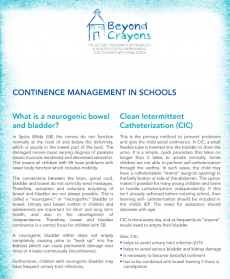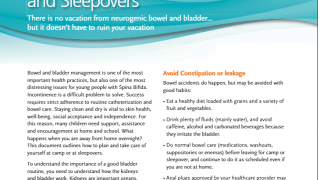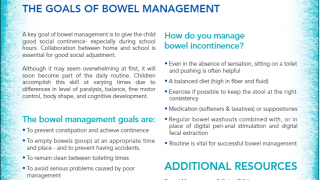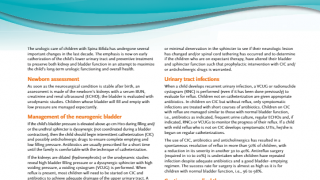What is a neurogenic bowel and bladder?
Children with Spina Bifida higher on the spine (near the head) might have paralyzed legs and use wheelchairs. The damaged nerves cause varying degrees of paralysis (neuromuscular weakness) and decreased sensation.
The connections between the brain, spinal cord, bladder, and bowel do not correctly send messages. Therefore, sensation and voluntary emptying of bowel and bladder are not always possible. This is called a “neurogenic” or “neuropathic” bladder or bowel.
Urinary and bowel control in children and adolescents are important for short and long-term health, and also in the development of independence. Therefore, bowel and bladder continence is a central focus for children with SB.
A neurogenic bladder either does not empty completely, causing urine to “back up” into the kidneys (which can cause permanent damage over time) or it leaks continuously (incontinence).
Children with neurogenic bladder may have frequent urinary tract infections.
Clean Intermittent Catheterization (CIC)
This is the primary method to prevent problems and give the child social continence. In CIC, a small flexible tube is inserted into the bladder to drain the urine. It is a simple, quick procedure that takes no longer than it takes to urinate normally.
Some children are not able to perform self-catheterization through the urethra. In such cases, the child may have a catheterizable “stoma” (surgical opening) in the belly button or side of the abdomen. This option makes it possible for many young children and teens to handle catheterization independently. If this isn’t already achieved before entering school, then learning self- catheterization should be included in the child’s IEP. The need for assistance should decrease with age.
CIC is done every day, and as frequently as “anyone” would need to empty their bladder.
Care & Storage of Catheters
CIC is done with washed hands-gloves are not necessary. Some catheters can be easily disposed of, but some need to be washed out and laid out on a paper towel to dry. In such cases, public bathrooms would not be an acceptable place to leave them. The nurse’s office may be most appropriate.
Bowel Management (Managing Incontinence & Constipation)
Because most children with SB also experience difficulty controlling bowel movements, a bowel management program may be necessary for both health and social acceptance. As children grow older, bowel continence offers an enormous increase in the successful social development and self-esteem, which impacts overall success in school.
Bowel management in school may include:
- recognizing and reporting bowel accidents or soiled clothing
- removing or replacing clothing
- inserting suppositories
- assembling supplies
- cleaning up supplies and restroom
- participating in bowel washouts or increasing personal responsibility for bowel program
- communicating with school nurse or trusted employee or friend
This information does not constitute medical advice for any individual. As special cases may vary from the general information presented here, SBA advises readers to consult a qualified medical or other professional on an individual basis.



